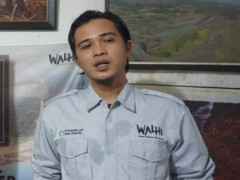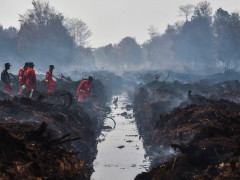Illustrator Competition #PerburuanMonsterPutih
By AdminCompanies Have Not Fulfilled Peat Restoration Mandate
NATIONAL INFO - A civil society coalition that focuses on peat issues, Pantau Gambut, found various irregularities in peat restoration governance in concession areas. The findings were presented by representatives of Pantau Gambut from Sumatra, Kalimantan, and Papua.
Pantau Gambut presented the findings from 1,222 sample points observed in 43 company concession areas in 7 provinces. There were 1.5 million hectares of burned peat area in 2015-2019 and 70 percent was located in the concession areas.
"68.7 percent of the 482 field verification points in burned peat areas have become abandoned land without any restoration efforts, while the remaining 32.2 percent is planted with extractive plants such as oil palm or acacia," said Romes Irawan Putra who represents Simpul Jaringan Pantau Gambut at a press conference on Friday, 28 May 2021.
Romes said that infrastructure for peat restoration was not found in 91.5 percent of the 335 sample points during field verification of restoration implementation. Only about 1.8 percent had infrastructures in the form of canals or drilled wells.
Another finding is that many of the infrastructures for restoration were not properly built, or were not built at all. "So, we have not seen the companies carrying out their responsibilities. Efforts to carry out restoration are still very weak,” said Puspita Indah from Pantau Gambut South Sumatra based on the results of monitoring six companies in South Sumatra.
Similar findings occurred in Kalimantan. Observation of 500 sample points spread over 12 concession areas showed that seven oil palm plantation concessions have not taken concrete action to restore peat. "Our monitoring results show that there are no field activities or post-fire recovery activities," said Nicodemus Ale from Pantau Gambut West Kalimantan. In fact, new fires were found in the area of some uncooperative companies.
The data from Central Kalimantan is more surprising. Large fires actually occurred in concession areas, especially oil palm plantations. Moreover, some companies were cultivating the peatlands that should be restored.
Massive violations by large companies occurred in Papua and West Papua because they left many peatlands damaged. “There is even a sago forest that has been converted into oil palm plantation,” said Sulfianto Alias from Pantau Gambut West Papua.
Even if the companies claimed to have carried out restoration activities, those were only for the benefit of the companies. "For example, they build canals for the rainy season so the palms won't die," said Feri Irawan from Pantau Gambut Jambi. They did not consider the impact of those canals on the surrounding community lands.
All representatives from the regions recommended the government to be more open in monitoring peat restoration by companies. So far, the government, through the Peat Restoration Agency and the Ministry of Environment and Forestry, has only published major restoration achievements in concession areas without any detailed information on the implementation and benchmark of the restoration success. Furthermore, law enforcement towards companies that violate the regulations also needs to be strengthened to give a deterrent effect. "We hope that the central and regional governments can follow up on violations that occur in concession areas. The government must have the courage to revoke the licenses of violating companies,” said Sulfianto.*
*THIS ARTICLE WAS PREVIOUSLY PUBLISHED ON 28 MAY 2021 ON ONLINE MEDIA TEMPO.CO




